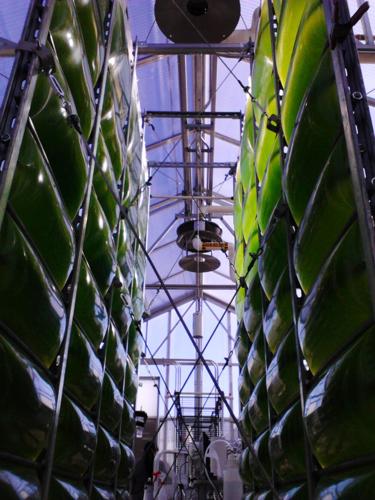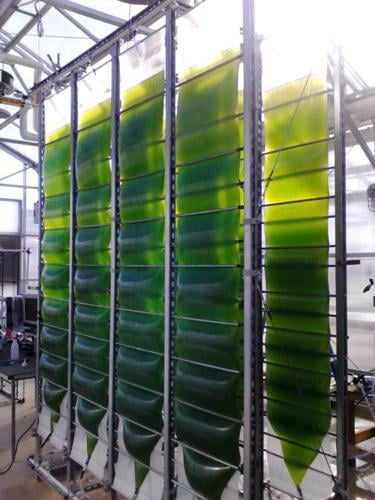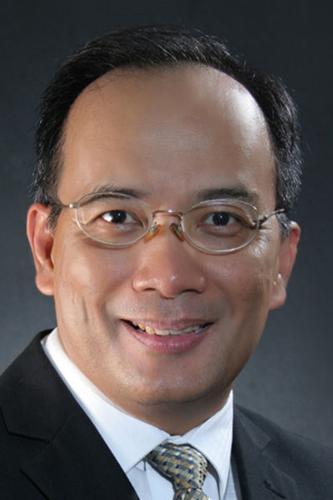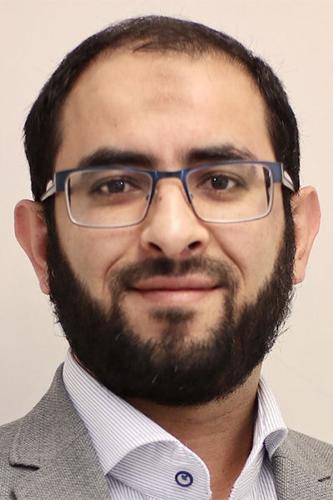A system developed by University of Arizona researchers to efficiently grow algae for health supplements and other uses could be making its way to market under a Tucson-based startup.
AlgaeCell Inc. has licensed technology for a system invented by UA professor Joel Cuello that is capable of sustainably producing industrial-scale microalgae or other microorganisms used in pharmaceuticals, nutritional supplements and vaccines.
The photobioreactor — a system to foster the growth of algae and other organisms that use light to grow — uses a special design to make it less expensive and more efficient than similar devices, said Cuello, a professor of biosystems engineering in the UA College of Agriculture and Life Sciences.
Bioreactors are commonly used for growing organisms such as yeast, bacteria and algae, as well as plant and animal cells to manufacture products including antibodies and vaccines.
But conventional bioreactors for microalgae use long tubes, pipes or columns, or sometimes panels made of glass or polycarbonate, which are typically expensive to manufacture and often fail to maintain desired mixing characteristics when scaled up for industrial production, Cuello said.
AlgaeCell’s Air Accordion Photobioreactor uses a system of inexpensive polyethylene bags arranged in a zig-zag fashion to maximize mixing of air and media needed for algae to grow.
“The Air Accordion is different because rather than a single-panel reactor, it’s several panels interconnected in a zig-zag pattern,” said Cuello, who joined the UA 26 years ago. “The way it zig-zags, as you’re bubbling up (air) from the column, it follows the zig-zag and that gives you longer path lengths and better mixing, which is the secret sauce of any bioreactor.”
The system is easy to scale up, and since it’s a closed system sealed off from environmental contaminants, it is perfect for growing food- and pharmaceutical-grade algae products, said Cuello, who is serving as an advisor to AlgaeCell and conducting company-funded research at the UA.
And while traditional bioreactors can be reused, they are hard to clean, he said. Once the polyethelyne material in the Air Accordion Photobioreactor is used, it can be reused or recycled, Cuello said.
The company initially plans to optimize the bioreactor to grow algae to produce spirulina — a cyanobacteria, or blue-green algae, used as a food supplement — and other algae that produce two common types of Omega-3 fatty acids, a supplement mainly derived from fish.
“These are super-foods, essentially,” Cuello said. “There’s a huge global demand for Omega-3 fatty acids for pharmaceuticals. Fish are able to accumulate these fatty acids by eating algae, so why not go straight to the source?”
In the next step in developing the bioreactor technology, the company is funding a product trial that will begin in the next few weeks, Cuello said.
Tech Launch Arizona, the UA’s technology commercialization arm, licensed the Air Accordion and five other bioreactor designs developed by Cuello’s Biosystems Engineering group to AlgaeCell in September 2020.
AlgaeCell was founded by CEO Hamed Ismail, a Norway-based investor and entrepreneur who worked for a Norwegian company that originally licensed the UA photobioreactor technology in 2015.
When that company failed to move the technology forward, Ismail launched AlgaeCell and negotiated a new licensing agreement with the UA.
Ismail said the Air Accordion bioreactor has the potential to disrupt the global nutraceutical market, which was worth $412 billion in 2020 and is projected to grow at more than 8% annually through 2027.
The algae product market alone is expected to reach $44 billion by 2023.
“I believe there’s nothing comparable to it on the market — it’s radically different thinking,” he said of the Air Accordion Photobioreactor.
Though Ismail, a Norwegian native educated in the United Kingdom, remains in Norway, AlgaeCell is taking up residence at the UA Center for Innovation, a business incubator at the UA Tech Park on South Rita Road.
Ismail said he funded the company with about $1 million of his own money and investments from friends and family, and intends to raise $500,000 to $2.5 million and has already attracted keen interest from local investors.
The money will be used to fund production of samples for prospective customers, Ismail said, adding that the company hopes to start taking purchase orders later this year.
Ismail said the company plans to set up a research and development center at the UA Tech Park and license the technology out to companies in Norway, the United Kingdom and Malaysia.
Ismail — who has not visited Tucson yet because of COVID-19 restrictions — said he’s been impressed with the support he’s enjoyed from Tech Launch Arizona and the local community.
“Since day one, we’ve been warmly welcomed by the community, at the Center for Innovation, the UA has been very cordial and we worked together to get right licensing agreement,” he said.
“We’re getting a lot of support, we’re surprised by the amazing services and startup support that is available both in Arizona and Tucson and nationally — it sort of cements our desire to stay in Arizona.”
“Sustainable production capabilities are becoming ever more critical in industries that have reached the tipping point using traditional methods,” said Bruce Burgess, Tech Launch Arizona’s director of venture development. “The technology licensed by (UA) to AlgaeCell opens the door for many producers to meet the increasing demands for product.”









